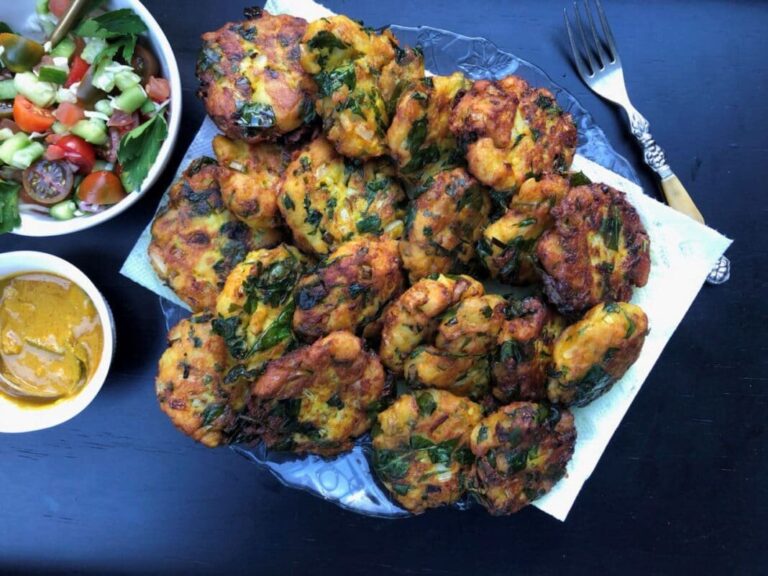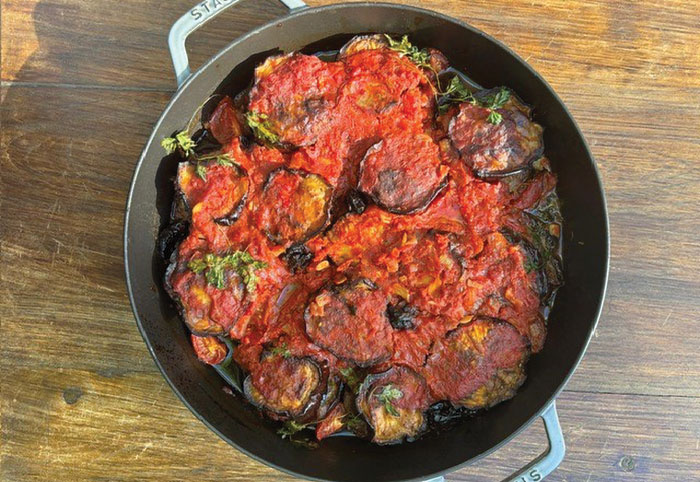A Winter Vegetable Soup for the Long Game
The wonderful thing about soups is that they are so nourishing and so comforting. Prepping the vegetables does take a little time, but once you throw everything in the pot, soup requires zero effort.

As a young schoolgirl, many of my afternoons were spent at my grandparents home in Rose Bay. After school, my brother Rafi and I would take a bus down Old South Head Road and then trudge up the hill to their red brick house at 36 Blake Street.My grandmother Nana Aziza would always have a large pot of soup on the stove. It didn’t matter what else she might be serving for dinner, anyone walking into her house was promptly served a bowl of soup.
My grandfather Aba Naji would come home around 5:30 pm and eat his bowl of (very) hot soup. At 6:00, the television would be tuned to the Australian Broadcasting Channel’s news hour and he expected quiet for that hour. Although I was young, I knew that all his attention was focused on news from Israel and the Middle East.
When my family moved to Los Angeles, my grandparents would visit for extended periods. Whether they were staying with us or at my uncle’s homes, my grandmother would always have that pot of soup on the stove. Many years later, their last home was on Canon Drive in Beverly Hills. My grandmother taught her Indonesian Muslim caregiver to make all her recipes. She predeceased my grandfather by 11 years, but every afternoon he was still served “her” soup.
My grandfather was born in Baghdad in December, 1918. His parents named him Shalom, commemorating the end of World War One and the end of corrupt Ottoman rule in Iraq. The family lived in a home on the Tigris River, surrounded by sweet smelling jasmine and mighty date palms. The front of the house held a waiting room filled with patients seeking medical attention from my great-grandfather Doctor M’rad. As a young man, my grandfather studied at the American University in Beirut, intending to follow in his father’s footsteps in the medical profession. The start of the Second World War meant that he had to return to Iraq. My grandfather found employment with the Iraqi civil service and was sent to teach in El Azair, a small village that houses the Tomb of Ezra the Scribe. My Nana Aziza’s father was the Shamash of the Tomb, as well as the large compound that included a yeshiva and lodgings for the many pilgrims who would come from all over Iraq to visit the Tomb.
My grandparents fell in love and were married March 17, 1943. My mother Sue is the eldest of their eight children.
Aba Naji lived to 101. Until his last days, I would often find him practicing that week’s haftara portion in preparation for reading it at synagogue on Shabbat mornings. He loved praying with his sons and grandsons and Rabbi Moshe Benzaquen. After services, many of the congregants would ask my grandfather for a blessing.
I always attributed my grandfather’s longevity to the good care and love he received from the women in his life. He was the adored eldest son of Emmy Lulu and M’rad and my grandmother was a truly devoted wife. I guess some of the credit can be attributed to his genes (his siblings all lived to their late 90’s). He was an active, social man who loved reading and writing poetry. With the help of one of my uncles, he self-published three books detailing his life, fables he had heard over the course of his life and his poetry.
My grandfather was a romantic, an artistic soul, a charming man who loved people and telling stories. (I loved that his term of endearment for me was “Sharon il’warad” Sharon the rose.)
In the 12th century, the great Jewish philosopher and doctor Maimonides wrote “No disease that can be treated by diet should be treated with any other means.”
I like to think that all the wonderful soups and stews and other dishes so lovingly prepared by my grandmother nourished my grandfather, as well as the friends and family that they gathered round their long, bounteous table.
—Sharon
Like Sharon’s grandmother, my grandmothers also believed in the power of soup. The wonderful thing about soups is that they are so nourishing and so comforting. Prepping the vegetables does take a little time, but once you throw everything in the pot, soup requires zero effort.
More often than not, our grandmothers’ recipes called for chicken or beef bones. But Sharon and I love to keep things vegan for the vegetarians in our life.
The flavors in this Winter Vegetable Soup are so rich and satisfying. The recipe includes canned crushed tomatoes and garbanzo beans (a great source of protein). Sautéed leek, celery, heirloom carrots, parsnip and garlic guarantee a wonderful base. The spices include sweet paprika and oregano. Parve chicken consommé powder is included, but can easily be omitted. Adding potatoes, delicata squash and white squash lend wonderful texture. But the truth is, any combination of vegetables will work—butternut squash, sweet potato, zucchini.
What could be better than a bowl of this soup on a dark winter’s night?
Easy, simple, delicious. What could be better than a bowl of this soup on a dark winter’s night?
—Rachel
Soup recipe
1/3 cup extra virgin olive oil
2 leeks, thinly sliced
4 stalks of celery, sliced
4 heirloom carrots, cut into rounds
1 parsnip, cut into rounds
2 Yukon gold potatoes, diced
6 large garlic cloves, chopped
2 tsp paprika
2 tsp salt
1/2 tsp black pepper
1 lb delicata squash, chopped into long slivers
4 medium white squash, chopped into 1/2-inch rounds
1 – 14oz. can crushed tomatoes
5 cups water
2 Tbsp chicken consommé powder
1 tsp oregano
1 – 14oz. can garbanzo beans, washed and drained
Heat oil in a large pot over medium heat. Add leeks and celery and sauté for 3 minutes.
Add carrots, parsnip, potato and garlic.
Sauté the vegetables for 10 minutes, stirring often, until the vegetables soften.
Add the paprika, salt and pepper.
Add the delicata squash, white squash, tomatoes, water, consommé powder and oregano.
Bring to a boil, about 10-15 minutes.
Add garbanzos and cover with a tight lid. Reduce heat and gently simmer for about 15-20 minutes.
Rachel Sheff and Sharon Gomperts have been friends since high school. They love cooking and sharing recipes. They have collaborated on Sephardic Educational Center projects and community cooking classes. Follow them on Instagram @sephardicspicegirls and on Facebook at Sephardic Spice SEC Food.






